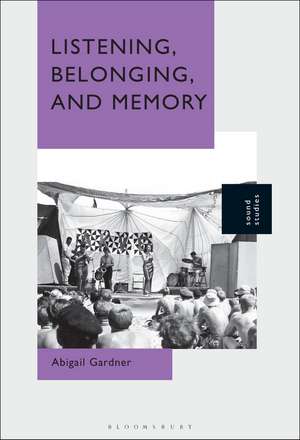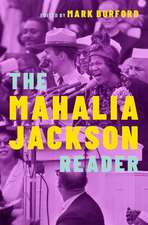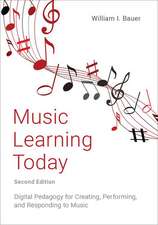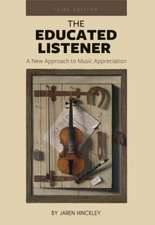Listening, Belonging, and Memory
Autor Dr. Abigail Gardneren Limba Engleză Hardback – 9 aug 2023
Preț: 538.26 lei
Preț vechi: 772.78 lei
-30% Nou
Puncte Express: 807
Preț estimativ în valută:
102.100€ • 107.90$ • 85.36£
102.100€ • 107.90$ • 85.36£
Carte tipărită la comandă
Livrare economică 09-23 aprilie
Livrare express 04-08 martie pentru 123.14 lei
Preluare comenzi: 021 569.72.76
Specificații
ISBN-13: 9781501376801
ISBN-10: 1501376802
Pagini: 192
Dimensiuni: 152 x 229 x 25 mm
Greutate: 0.43 kg
Editura: Bloomsbury Publishing
Colecția Bloomsbury Academic
Locul publicării:New York, United States
ISBN-10: 1501376802
Pagini: 192
Dimensiuni: 152 x 229 x 25 mm
Greutate: 0.43 kg
Editura: Bloomsbury Publishing
Colecția Bloomsbury Academic
Locul publicării:New York, United States
Caracteristici
The focus on listening to voices, sounds, silence, testimonials, stories and snippets allows for a creative approach that borrows from memory, sound, popular music and cultural studies
Notă biografică
Abigail Gardner is Professor of Cultural Studies at the University of Gloucestershire, UK. She is the author of Ageing and Contemporary Female Musicians (2020) and PJ Harvey and Music Video Performance (2015) and co-author of Aging and Popular Music in Europe (2020) and Rock On: Women, Ageing and Popular Music (2012), with Ros Jennings.
Cuprins
List of FiguresPreface Acknowledgements Introduction: Life as a Listener1.Connecting Lineages2. Applying Connected Listening3. Listening Across Age(s)4. Listening and Belonging 5. Listening, Migration, Voice, and Place6. EchoesBibliographyIndex
Recenzii
Gardner does for sound what Ellis did for vision in Seeing Things (2000), establish listening as witnessing, working through and in this book as thinking with your ears. Immersed as we are in podcasts, music streaming, radio, political speech, text-to-audio machine learning, and voices from the analogue past re-mastered, Gardner's book is very timely. Listening, Belonging, and Memory addresses the multi-modality of contemporary listening, but also the social justice rationale for proper and careful listening in an age of multiple and conflicting claims to free speech in our slogan-dominated visual culture.
Abigail Gardner ponders the taken-for-granted act of listening, to understand its contexts and nuanced relationship to how voices and the stories they tell are heard, to belonging, to memory and thus to understanding history, community and indeed one's own self. This is a richly empirical book that listens to a range of voices and representations including those of war veterans, to migrants and their music, social media memorialization by the Auschwitz Museum of the victims of the Holocaust to everyday narratives recorded by public service broadcasting. Between sound, image, narrative, and silence (and the silenced) it is humanely attuned to and informative about the ways in which listening has been theorized and practiced. Central to this process is a lyrically expressed engagement with method as Gardner is vividly present in this book, her affective and accessible writing inviting us to understand the scholar's own act of listening as research, reflective about her own position and processes of listening to others in the act of telling. Informed by a committed Cultural Studies tradition, a feminist politics and a sensitivity and respect for ordinary life, Gardner is someone to listen with and closer to in comprehending contemporary memory practice and everyday historiographical work.
Poetic in its tone and sensibility and yet carrying strong political and ethical threads, this book beautifully considers listening in the structures of communities and storytelling. Drawing on key work within memory studies, feminism, affect and media studies, the book takes a variety of approaches to carefully map the impact and power of listening.
Abigail Gardner ponders the taken-for-granted act of listening, to understand its contexts and nuanced relationship to how voices and the stories they tell are heard, to belonging, to memory and thus to understanding history, community and indeed one's own self. This is a richly empirical book that listens to a range of voices and representations including those of war veterans, to migrants and their music, social media memorialization by the Auschwitz Museum of the victims of the Holocaust to everyday narratives recorded by public service broadcasting. Between sound, image, narrative, and silence (and the silenced) it is humanely attuned to and informative about the ways in which listening has been theorized and practiced. Central to this process is a lyrically expressed engagement with method as Gardner is vividly present in this book, her affective and accessible writing inviting us to understand the scholar's own act of listening as research, reflective about her own position and processes of listening to others in the act of telling. Informed by a committed Cultural Studies tradition, a feminist politics and a sensitivity and respect for ordinary life, Gardner is someone to listen with and closer to in comprehending contemporary memory practice and everyday historiographical work.
Poetic in its tone and sensibility and yet carrying strong political and ethical threads, this book beautifully considers listening in the structures of communities and storytelling. Drawing on key work within memory studies, feminism, affect and media studies, the book takes a variety of approaches to carefully map the impact and power of listening.













